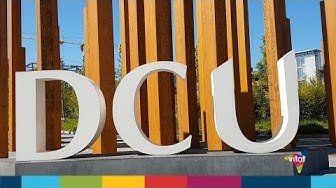- Student-faculty ratios: 24.0
- Male to female ratio: 57 : 43
- School nature: Public
- Website: https://www.dcu.ie/
- Address: Glasnevin,Dublin, 9,Ireland
- Phone: -
Describing itself as a 'university that looks to the future,' Dublin City University (DCU) has been broadening the horizons of students on its lively campus since it opened in 1980. A large expansion programme throughout 2015 and 2016 saw the incorporation of several colleges under the DCU umbrella, including St Patrick's College Drumcondra, Mater Dei Institute of Education and Church of Ireland College of Education. With DCU’s expansion came an increase in its academic portfolio. The university offers a total of 70 taught programmes across Humanities and Social Sciences, Science and Health, Engineering and Computing and DCU Business School faculties including 10 different degrees in teacher education (DCU has established the first faculty of education in an Irish university). Occupying a 72-acre site in the Glasnevin area, just north of Dublin itself. DCU is home to over 12,000 registered students, including full-time undergraduate and postgraduate students, as well as students doing distance learning. The university boasts a number of Research and Enterprise Hubs that facilitate research partnerships between academics and external organisations. It also comprises the John and Aileen O'Reilly library, with 400 workstations, 1,200 seats and 18 collaborative rooms. It bills itself as the first university library to put digital records on the same footing as books and journals, granting access to some 250,000 volumes, a number that is growing as technology improves. Its campus also includes restaurants, a theatre and conference centre, a crèche and a university sports complex. DCU's other major focus is business and enterprise: the university estimates 50,000 of their graduates are employed in significant positions within industry. It also prides itself on its USTART start-up accelerator programme, which supports students by lending them space and funding to launch their own businesses. The university separately runs a series of summer schools as part of a 'DCU in the Community' programme. These involve public talks in the nearby area of Ballymun, on topics recently including social psychology, public speaking and mental health.
- Total number of students 9,337
- Number of international students 1,379
- Total number of academic staff 358
- Number of international staff 97
- Number of undergraduate degrees awarded 1,830
- Number of master's degrees awarded 796
- Number of doctoral degrees awarded 108
- Number of research only staff 187
- Number of new undergraduate students 2,420
- Number of new master's students 731
- Number of new doctoral students 111
- Global score 37.7
- Global research reputation #601
- Regional research reputation #318
- Publications #941
- Books #435
- Conferences #575
- Normalized citation impact #714
- Total citations #905
- Number of publications that are among the 10 percent most cited #840
- Percentage of total publications that are among the 10 percent most cited #653
- International collaboration #653
- Percentage of total publications with international collaboration #183
- Number of highly cited papers that are among the top 1 percent most cited #864
- Percentage of highly cited papers that are among the top 1 percent most cited #746
*The above data comes from: Official website of U.S.News
-

24.0
No. of students per staff
-

10%
Percentage of International Students
-

57 : 43
Student Ratio of Females to Males
-

12,619
Number of FTE Students
*The above data comes from: Official website of TIMES
-
World University Rankings
-
2016
401-500
-
2017
401—500
-
2018
401–500
-
2019
401–500
-
2020
601–800
-
-
Young University Rankings
-
2012
86
-
2013
84
-
2014
92
-
2015
75
-
2016
79
-
2017
=74
-
2018
=80
-
2019
94
-
-
Arts & humanities
-
2018
201–250
-
2019
251–300
-
-
Clinical, pre-clinical & health
-
2018
301–400
-
2019
301–400
-
-
Engineering & technology
-
2018
251–300
-
2019
301–400
-
-
Life sciences
-
2018
251–300
-
2019
401–500
-
-
Physical sciences
-
2018
401–500
-
2019
401–500
-
-
Social sciences
-
2018
251–300
-
2019
251–300
-
-
Business & Economics
-
2019
301–400
-
-
Computer Science
-
2019
201–250
-
-
Impact Rankings: Partnerships for the goals
-
2019
48
-
-
Impact Rankings: Climate action
-
2019
28
-
-
Impact Rankings: Responsible consumption and production
-
2019
42
-
-
Impact Rankings: Industry, Innovation, and Infrastructure
-
2019
101–200
-
-
Impact Rankings: Decent work and economic growth
-
2019
96
-
-
Impact Rankings: Quality education
-
2019
101–200
-
-
Impact Rankings: Good health and well-being for people
-
2019
101–200
-
-
University Impact Ranking
-
2019
98
-
*The above data comes from: Official website of TIMES
-
#431 Chemistry
Show ranking metrics under this major
- Chemistry overall score 44.1
- Chemistry global research reputation #347
- Chemistry regional research reputation #222
- Chemistry publications #683
- Chemistry normalized citation impact #337
- Chemistry total citations #568
- Chemistry number of publications that are among the 10 percent most cited #519
- Chemistry percentage of total publications that are among the 10 percent most cited #282
- Chemistry international collaboration #408
- Chemistry percentage of total publications with international collaboration #70
- Chemistry number of highly cited papers that are among the top 1 percent most cited #464
- Chemistry percentage of highly cited papers that are among the top 1 percent most cited #371


